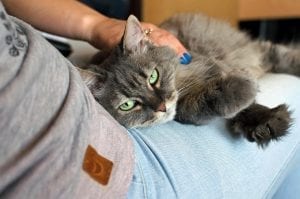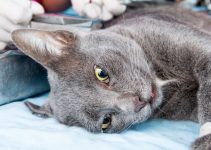Whether while petting them, or watching them sleep, we would usually hear a soft sound that our cats are making. Our little paw friends purr for many reasons, at times you could feel them sending our small waves of love towards you. Sometimes, we would notice a purring from our cats when they are asleep, hungry, happy, feeling some discomfort, or other factors.
And purring can be too loud or abnormal sometimes Purring is a way of communication, if your cat is purring at you, it is trying to tell you something. Cats usually make that sound more often than other sounds such as meowing or growling. Unfortunately, purring too loud does not always mean your cat is very comfortable when napping, or it is having some pleasant time. At times, the loud purr is a sign for another condition.
So why Does My Cat Purr So Loud? And what are the possible reasons that could make it do so?
NOTE: We want to inform our blog readers that before we publish any article, the team “Proudcatowners” does deep research based on experience and knowledge about cats and everything related to them, to guarantees reliable and precise information, satisfy the readers is our first priority.
Why Does My Cat Purr So Loud?
Purring is still a mysterious trait of cats and their physiology. For those feline creatures, purring is a voluntarily produced sound, therefore, if your cat purrs loud, it is because they are expressing emotion, a need, or asking you for something. Several reasons can make your cat purr too loud, some of which we mention below:
Pain
If your cat is purring too loud, it might be feeling extreme irritation, it might also be because of an injury, or that your cat is suffering from another underlying condition. The cat might be in massive pain and is expressing it through purring very loudly, especially if it is showing any other signs of discomfort while doing so. Purring sounds and vibration tend to release endorphins that make the cat feel good.
So, if a cat purrs too loud while experiencing pain, it might be its way of dealing with agony, which can be similar to humans, for example. When we get hurt, some of us tend to make some sounds to help our bodies through the pain or move some body parts in calm, slow motions. At times, you can notice a baby sucking its thumb when crying as well. The same thing for your little pet child, it uses purring to soothe the pain and relieve its discomfort a little bit.
Heat
A heat cycle, or also known as an estrous, is when reproductive organs go through a regular cycle that permits the reproduction process to happen. Female cats usually reach this sexual maturity at the age of 5 to 9 months old, while male cats reach it when they are between 9 and 12 months old. When female cats go into a heat cycle, their body indicates that it is time for breeding.
This heat cycle would usually last for a week, and during this week, you will hear your cat making different sounds, including purring. Often, female cats make loud purring noise when they are calling a mate to breed, and since cats mate more than once a year, you can end up with many kittens if you have an unsprayed female cat.
How do I know that my cat is going through a heating cycle?
The first thing you would notice in your cat is its vocalization, including purring loud, other symptoms might include:
- Insisting on going outside
- Rolling and turning on the floor
- Urine spraying
- Seeking more attention than usual
- Being very demanding
- Rubbing its face on different surfaces or items
- Lifting its hind end and wiggling it
Anxiousness or Anxiety:
Like all animals, cats can also suffer from anxiety. Your cat will display various symptoms and signs to show it is anxious, one of which is loud purring. These signs might develop into becoming a destructive behavior. Anxiety in cats is usually triggered by specific things, such as events, objects, a change in environment or routine, or remembering an old trauma that they went through.
Their destructive behavior can lead to harmful consequences, such as causing hurt unintentionally to others or themselves. They might scratch or rub their skin too hard until they develop bald spots.
Other symptoms that show your cat is anxious:
- Loud Purring
- An increase in vocalization
- Vomiting
- Quick changes in mood
- Being aggressive
- Unstable eating habits
- Irregular loss or gain of weight
- Lethargy
- Hiding
- Following you or other people around
Identifying the reasons for your cat’s anxiousness are very important because it might be a symptom of another underlying health condition. Checking with your veterinarian would help rule out any diseases, and he would prescribe some medications for your cat to help with its anxiety.
Hunger
British researchers found out that the purring sound which cats frequently make, and the purring sound they make when they are hungry, are very distinct sounds. When your cat purrs loud when it is hungry, its purring is usually different, and it is combined with a high-pitched sound, similar to a light tone of meowing or light crying.
Cats are brilliant, so if you follow a feeding schedule and provide them with food at the same time every day, they will remember it and start purring loud every time it is meal time, they would stare at you and continue purring until you finally fill out their bowl.
Cats might also produce loud purring sounds if they are asking for a treat. Some say this loud purring is a way for cats to trick their owners into giving them what they want, they mimicking baby-like voices with that high-pitched purring.
Age
As cats grow older and develop a more significant body, becoming a full-sized cat, their purring becomes louder because they develop more durable vocal cords and their chest gets more prominent, so it vibrates even more. And sometimes, they develop some health issues while ageing as well.
Purring loud for old cats can be because they are expressing loneliness, for example, pain, or just seeking attention from anyone around. In most cases, a cat’s purr at the age of 2 remains the same for the cat as it grows older; however, in other cases, a cat’s purring gets louder as it gets older.
Reasons for a cat’s purring loud sound vary from one cat to another, and it can be personal depending on the cat, the environment, and even the breed sometimes. Some cats tend to purr loud out of jealousy, being an old cat, and the owner brings a new cat, you might hear your old cat produce very loud purring sounds as well.
Happiness
A cat’s loud purr can be a sign of their happiness and excitement. When your cat has been fed, or it is enjoying the food, you can hear it purr very loudly. Besides, something that all cat owners noticed is their cat’s loud purr when it crawls up in their lap.
The reason behind that purring is usually happiness and comfort. When your cat crawls up to the bed and makes itself comfortable next to you, or curls up on your lap, or even on your chest sometimes, you will hear loud purring. That is your cat’s way of telling you it is happy to be there, and it is very comfortable and relaxed as it takes a nap.
We can relate it to how humans or dogs, for example, express those good feelings of happiness and comfort. Humans would usually smile or laugh. Dogs would wiggle their tails in excitement, and cats would purr loud. That’s their way of communication method.
Breed
When it comes to loud purring, all cats do that from time to time, however, some cats happen to purr louder than others. Here is a list of those cats:
Siamese
Siamese is known to be one of the loudest cats when it comes to purring. Many people say that a loud purring sound of Siamese resamples a crying baby’s sound at times. They can sometimes disturb their owners at night, but they can also have a very long meowing conversation with them because Siamese is not only known for its loud purring, but also for being very talkative.
Burmese
This breed shares the same genes of loudness as Siamese, as it originated from the same land as them. They have a loud, sweet purring, and enjoy cuddles more than other cats.
Japanese Bobtail
This breed is a self-recognized diva when it comes to loud purring. Just like Burmese, they have excellent vocal abilities, and they are aware of that. They can pull off an amazingly wide range of loud purring sounds. In addition to exceptional “singing abilities”, this breed is also known to be a charm of good luck.
Oriental
Unlike our diva Japanese Bobtail, an oriental cat’s loud purring usually resembles a truck’s rumble. This breed is often compared to Siamese, but they are known to be the cats that share a strong bond with the owner, especially that they live for fifteen years or more.
Tonkinese
This crossbreed of Burmese and Siamese inherited loud genes from both of them. Tonkinese cats love to chat, and they like to so loudly. This breed is known to produce loud purrs as well, and it is one of the loudest purrers, but also one of the most playful ones.
Should I be worried?
If your cat is purring while showing other signs of discomfort, for example, it is best to take it to the veterinarian. Some cats purr loud out of joy and happiness, other out of pain, discomfort, or injury. Taking your cat to the vet would help diagnose any underlying condition if there is one,
Why do cats purr loud while sleeping?

When cats are going into their REM, they tend to produce loud purring sounds. When your cat is curled up and ready to take a nap or have a good night of sleep, these sounds are usually a sign of comfortable sleep or sweet dreams. But that loud purring fades away as they fall into a deeper sleep.
At times, if your cat is purring too loud while sleeping, or showing symptoms of discomfort while sleeping as well, it is best to get it checked out. Loud purring while sleeping can be a sign of relaxation, but abnormal loud purring can be a sign of another underlying health condition.
Why do cats purr loud at night?
For most times, when cats purr loudly at night, they are expressing their joy and pleasure for being able to curl up in their little bed, or take over your bed and have sweet dreams. Loud purring at this time is unlikely to be a sign of discomfort or anxiousness.
If your cat’s loud purring bothers you, the most suitable solution you can do is to send her out of the room softly. If your cat is used to sleeping with you, you should try playing active games with it before bedtime, so that it would feel tired and dozes off quickly once it curls up on the bed.
Do males cats purr louder than females?

There is n clear rule of which sex purrs louder than the other when it comes to cats. Both of them can be very loud, during different times, and due to various reasons. For example, when female cats go into heat, they can be very loud when calling for mates, however, male cats can purr very loudly as well when searching for mates.
For behavioral differences, however, female cats are more well behaved, loving, and calmer than male cats, especially during the mating period. Male cats also purr loud whenever they get into a quarrel, for example, trying to get the attention of female cats.
Why do cats purr so loud when they mate?
When cats mate, they bawl and produce very loud purring sounds. Female cats usually make louder purring sounds during mating, and they can become aggressive as well, during or after mating with male cats. Loud purring can also be due to pain for female cats. Male cats’ penis is thorny, i.e., it has thorns on it, and it can be very painful for female cats, which causes them to purr very loudly, and become aggressive at times.
Why do cats purr so loud before they fight?
During cat-fights, cats usually purr loud because they either scared or angry. Cats tend to produce loud purring sounds to express these sounds, or sometimes to intimidate the other cat. Male cats, however, tend to purr very loud in these cases to get the attention of female cats. Just like humans, male cats like o show off their strength to female cats, and so, they purr loud to attract their attention before or during a fight.
Do some cats purr louder than others?
When it comes to genetics, some cats naturally can purr louder than others. And there are even some species that do not purr at all. Siamese, Burmese, Japanese Bobtail, Oriental, and Tonkinese cats usually purr the loudest. Their purring sounds are more distinct than other breeds. In addition to that, older cats tend to purr louder than younger ones. There are, however, some exceptional cases in which younger cats tend to purr louder than senior cats.
Why do cats purr louder when we pet them?

When your cat purrs loud when you pet it, it is its way of showing you it is enjoying it. Loud purring by cats when they are being petted is their way of being friendly and communicating their feelings to you. It helps create a stronger bond between the cat and the pet parent. When a cat is feeling relaxed and comfortable, its body releases endorphins when the cat purrs, which make that cat feel good as well.
Is it true that purring has a healing power for cats?
When cats purr loud, they use that vibration to heal themselves and relieve their pain, because purring helps the cat’s body to release endorphins that help with the pain. Cats purr within a range of 20 to 140 Herts of frequency, and it is constructive for everyone within that range. A cat’s purr does benefit not only the cat itself but also humans around it. Cats are known to be extraordinary mental support animals, and pet therapy has been becoming more influential these past years. It is a commonly shared belief that pet owners live longer, so here are some benefits of cats purring on humans:
- Lowering stress
- Lowering the chances of having a heart attack
- remarkable decrease in the symptoms of Dyspnea
- Strengthening of bones
Conclusion
Cats are known to purr at times they purr too loud. Cats’ purring can be contributed to several reasons, the most common belief is that cats purr loud when they are happy or joyful or relaxed, which is true, but it is not the only reason. Cats can purr loud as well if they are feeling pain, suffering from an injury, or if they are trying to communicate a feeling other than happiness as well, such as anxiousness, loneliness, or sadness.
If you notice your cat purring when it is meal time, it is telling you to fill in their bowl, because cats are very smart, and they tend to remember their feeding schedule if you feed them regularly. Another reason for cats to purr loud is the heat cycle. When it is mating season, female cats go into heat, and they purr very loud when calling for mates. And male cats tend to be very loud as well when purring when they are searching for mates.
Another aspect of male cats is that they tend to purr loud to show off and get the female cat’s attention. When it comes to genetics, there are some breeds which purr louder than others, naturally, such as Siamese and Tonkinese. Cats purring is beneficial for their body, as it helps the body produce endorphins that make the cat feel good, but this purring is not helpful for cats.
Loud Cat purring is known to be very beneficial for humans as well, as it helps reduce the chances of getting a heart attack and helps lower stress levels. If your cat displays any abnormal symptoms when purring loud, you should take it the vet immediately to help diagnose it and reassure you.





